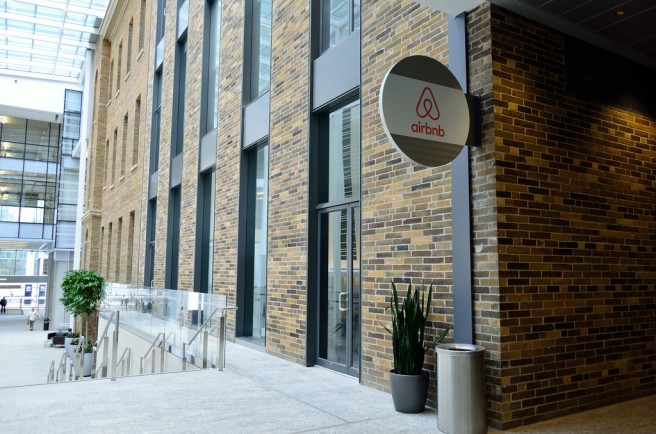“Of all tyrannies, a tyranny sincerely exercised for the good of its victims may be the most oppressive. It would be better to live under robber barons than under omnipotent moral busybodies. The robber baron’s cruelty may sometimes sleep, his cupidity may at some point be satiated; but those who torment us for our own good will torment us without end for they do so with the approval of their own conscience.” ―C.S. Lewis

Capitalism: The motivating fear that something, somewhere, could be more convenient
New York Gov. Andrew Cuomo recently signed into law a broad salvo for powerful special interests against the less privileged New Yorkers he purports to champion. I’m referring, of course, to the latest instance of grotesque regulatory capture that is the Empire State’s new anti-Airbnb legislation. Put mildly, it has the insidious effect of protecting politically connected businesses—i.e., the hotel industry—from the healthy, consumer-friendly pressures of free-market competition.
To be clear, the chairman of the Hotel Association of New York City, Vijay Dandapani, admits this openly:
“This smart and innovative legislation will allow law enforcement agencies to better target, track, and penalize lawbreakers, while also protecting one of New York’s most vital economic contributors—the hotel and hospitality industry.”
Famed New York hotelier Donald Trump would be pleased.
The usual term for such manipulation of government power to serve special interests is cronyism. New York has a well-documented hostility to the kind of policies that encourage innovation by forcing companies to sink or swim on the strength of the comparative value they provide consumers, rather than the elasticity of their government connections. So, as my college friend Jay Schweikert once said of the 2016 cycle, this development is hardly surprising but freshly disappointing.
But, as C.S. Lewis notes of the worst tyrannies, Cuomo and the New York cronyists social justice warriors don’t just satisfy themselves with the mere fact of regulating away opportunities for the politically disadvantaged. As they seem always compelled to do, these elites invoked the eternal progressive shibboleth of looking out for ordinary people while actually screwing them over.
Democratic Assemblywoman and bill sponsor Linda B. Rosenthal of Manhattan described it to The New York Times as follows:
“New York is taking a bold step that will hopefully set a standard for the rest of the country and other countries in the world that are struggling with the impact of Airbnb on affordable housing.”
The same article included this telling contextualization of a statement from Cuomo spokesman Rich Azzopardi:
Regulators and affordable housing advocates around the world worry that Airbnb is making it easier to illegally rent out apartment units for short stints to travelers, taking units off the market for full-time residents and driving housing costs higher. Mr. Azzopardi said that illegal rentals “compromise efforts to maintain and promote affordable housing by allowing those units to be used as unregulated hotels.”
If you simply took the Times reporting and New York officials’ statements at face value, you might be inclined to think state leaders had scored a victory of some merit against rapacious corporate powers. But this willful legerdemain disguises two severely inconvenient but highly relevant truths. First, the new law imposes steep fines, not on Airbnb, but instead on ordinary people, like you and me, who advertise openings through the service. (A federal lawsuit argues this is illegal and unconstitutional.) So if you want to fill some empty beds in your place to help pay your rent, you could get slapped with a $7,500 bill from a government that ostentatiously pretends to fret that your cost of living is too expensive. Second and relatedly, Airbnb, unlike the hotel industry, provides flexible income and economic opportunity to people who can’t afford lobbyists:
The politicians are responding to hoteliers and unions that claim that mini-Donald Trumps are buying up properties and renting them as “illegal hotels.” This doesn’t check out: More than 95% of New York Airbnb hosts sharing their entire home post only one property, and the company last year yanked roughly 3,000 illegal listings out of some 44,000 in New York. The hotel industry also riled up some affordable housing groups to say that Airbnb is driving up the cost of rent. One irony is that more than three-quarters of hosts say that sharing their space helps them pay rent.
The real complaint is that Airbnb is unwelcome competition, and here’s how you know: The company already offered Empire State regulators everything they claimed to want. Airbnb said it would ban New York hosts from renting more than one property; require online registration for hosts; ban users who break policies three times; and collect state taxes so that hosts couldn’t cheat. That’s right: Airbnb wanted to help New York dig up more revenue.[…]
This is a classic restraint of trade, and all the more odious that it will hurt the people Democrats claim to champion. Airbnb points out that hosts in zip codes with the highest percentage of black New Yorkers earned $43 million from rentals in 2015, and that more than 21,000 millennials host an Airbnb property.
The astute observer will note that progressives imposed exorbitant housing and hotel prices on Airbnb users, many of them lower-income minorities, from New York to San Francisco, long before modern technology made Airbnb possible. The progenitors and supporters of these regulatory labyrinths almost certainly had the best intentions in maintaining policies that keep rents high and undercutting innovation, like Airbnb, that helps people pay those rents. But as famed paleontologist Dr. Alan Grant reminds us, some of the worst things imaginable have been done with the best intentions.
A similar dynamic played out with the curious story of ridesharing services in the notoriously progressive metropolis of Austin, Texas earlier this year. The taxi industry in the Lone Star capital pushed through a package of onerous regulations, including fingerprinting requirements for drivers (who are already subject to background checks), in the guise of promoting “consumer safety,” a “level playing field,” and other anodyne lies. In reality, the rules undercut Uber and Lyft’s ability to operate efficiently and compete with taxi companies in the city. Incidentally, the new security requirements were about as conducive to safety as the TSA, with comparable downsides for minorities. Brishen Rogers sums up the point well in a white paper for the UChicago Law Review:
[Background] checks are no panacea. As the Equal Employment Opportunity Commission (EEOC) has emphasized, background checks have limited predictive value and can have a disparate impact on minority drivers. More generally, however, there is no indication that criminal law will not deter assaults just as well in Uber cars as it does in taxis. In fact, criminal law may work far better, since any passenger who suffers an assault by an Uber driver will actually be able to identify their driver. Not so in a street-hailed cab.
Rogers goes on to note, among other things, that ridesharing companies’ transparent ability to track data on driver and passenger interactions afford Uber and its peers the ability to combat the rampant racial discrimination for which taxis are notorious. But notwithstanding all that, the taxi industry succeeded in chasing Uber and Lyft from Austin, and 10,000 drivers who benefited from flexible schedules and supplemental income, as even famed Obama loyalists acknowledge, were effectively pink-slipped.
For those keeping score: progressives who claim to value consumer safety, non-racism, accountability, economic security, and equal opportunity directly favored an allegedly racist industry with weaker mechanisms for accountability by reducing economic security for thousands of people through diminished opportunity without making anybody safer. The taxi industry’s expulsion of ridesharing from the second-largest state capital in the country is primarily a blow against the members of and aspirants to the city’s middle class who benefited from a boon in transportation choices.
That cronyism for progressive donors (in this case, Big Taxi) made for effective manipulation of progressive voters’ obsession with good, social justice intentions (to drive out competition for those donors) to achieve harmful results (see above) is how the game works.

“I shop at Whole Foods, and I’m here to help!”
The treacherous campaigns against the sharing economy are reminiscent of Obamacare springing from its Trojan fact checks and administrative lies to torch Medicare recipients and the besieged middle class with catastrophic deductibles and coercive spikes in costs. Obamacare, the exclusive product of “economic justice” warriors and the progressive donor class, saved its worst for the little guys who can’t afford progressive elite’s sanguine abstractions about a poor product and growing suffering. But, as with everything else, we are to believe this cratering fiasco is good for the people it mobs. Apropos, Matthew Yglesias at Vox (because, of course) argues the solution to Obamacare’s rising premiums is stiffer penalties on cash-strapped folks who lost their former plans and can’t afford the mandated new ones.
As technology improves and ambitious entrepreneurs develop more disruptively valuable products and services, the friction between legacy industries and innovative market paradigms will only increase. Desperate but well-connected benefactors of obsolescing fiefdoms will ever more rapaciously seek to restrain the economic progress that would subdue them. They will always claim to champion the interests of the very constituents they ravage for their misbegotten sustenance, as taxis and hotels cannibalizing the income of their once-emancipated subjects. But either progress will devour the dependents of cronyism, or the restraints will nibble away at the powers that impose them.
Someday, perhaps, New York, Austin, Washington, and other locales will have leaders who understand this—and make the right call.

